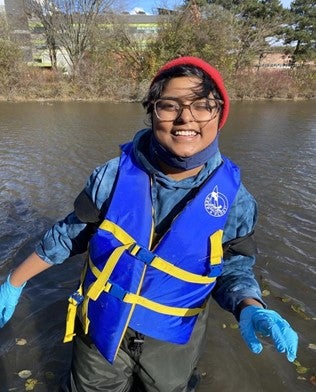Reflections from an upper year SERS student

There is a lot of media surrounding multiverses right now, and I cannot escape this content's hold on me. I often find myself wondering, who would I be in another universe? Would I have chosen ERS as my degree of choice or would I have followed my literary heart toward an entirely different course of study?
Which then of course made me curious. Why did I choose this program in the first place? If I were a true altruist, I think I would say something like “I wanted to save the world and ERS was the best way to do that.” But that simply isn’t true because I had no intention of saving anything when I joined this program.
I actually had no idea if ERS was even right for me, but my mother convinced me that I at least had to give it a shot. And if there is one thing that I know for certain it is the fact that Ranjana Dasgupta would never lead me wrong and she was right, in that way she always was, about which place one should build their home.
I am actually if anything an ERS person in most aspects of my life. I think I had some qualities of this program before I even started and I know that this was the right place for me to build my undergraduate career. Although, I am also deeply interested in writing and thusly soothed my literary heart by pursuing an English and Literature minor. It is this minor which has allowed me to craft the following revelations of what it means (at least to me) to be an ERS student. I hope you enjoy and if you do not… well I am graduating anyway.
Me in my last Laurel Creek Cleanup.
A SERSies of Revelations
- The environment we choose to protect, study, and maintain is the rightful territory of numerous Indigenous peoples. Any work we do as ERS students must first begin with an acknowledgment to Indigenous groups and this is just a start. The future of sustainability, restoration, environmental assessment, and development should include not only a seat at the decision-making table for Indigenous peoples but rather a table of their own to lead these conversations and processes.
- An incredible amount of invasive species exist in Canada and there are an incredible amount of solutions to slow their rapid expansion across the country. However, the one I find the most promising is adaptation instead of complete removal, especially for species such as Garlic Mustard, Common Buckthorn, and Invasive Phragmites.
- You come to ERS most likely because you care about nature and have some form of resentment towards the people destroying it. You leave with a love for both people and the environment because you will find that they are deeply connected, for better or for worse.
- Speaking about love, do you have a favourite bird or a favourite tree yet? No, it is not required, but it sure is fun to figure out.
- I love chickadees because they are always around (even in the winter) and their name is similar to their call (chicka-dee-dee-dee).
- I love Elms because you can never quite tell if they are alive or dead at first glance. Isn’t it wonderful to know that we are not the only beings to disguise the reality of our existences?
- Empathy is a skill that you will learn over time, but it is deeply required. The most we can do at times is listen and attempt to understand someone’s perspective. In doing so, we must also remind ourselves of who and what we are fighting for. I have come to walk a thin line between resistance and empathy.
- Depending on how you pick your courses and your co-ops, you might spend a shockingly large amount of time inside! Try to go for more walks, bike rides, and adventures in the great outdoors. Don’t lose touch with the very systems you wish to protect, lest you forget your favourite tree or bird.
- All ERS kids are a little odd but in the best ways. All of my friends in my program have made me realize and appreciate my unique tendencies. For example, you might find yourself in a public space where there is music. And you might find yourself dancing and watching as no one around you does, except for that one person in the corner with their Newcombs Wildflower Guide. Welcome to ERS, keep dancing as if you are the only ones in the room, and make sure not to bring the burrs inside.
- And about you. It’s okay if your interests are a bit niche or if they are all too familiar. I realized that I am interested in storytelling about nature, you may have noticed from my over-poetic notions about Elm trees, and I am aware that it might be a niche subject. I also have friends who are interested in broader and more defined subjects such as avian ecology, urban planning, or impact assessment. The greatest thing about this program is that all your interests are valid and can be your future career.
- Just make sure to plan your courses well!
Thanks for the last five years.